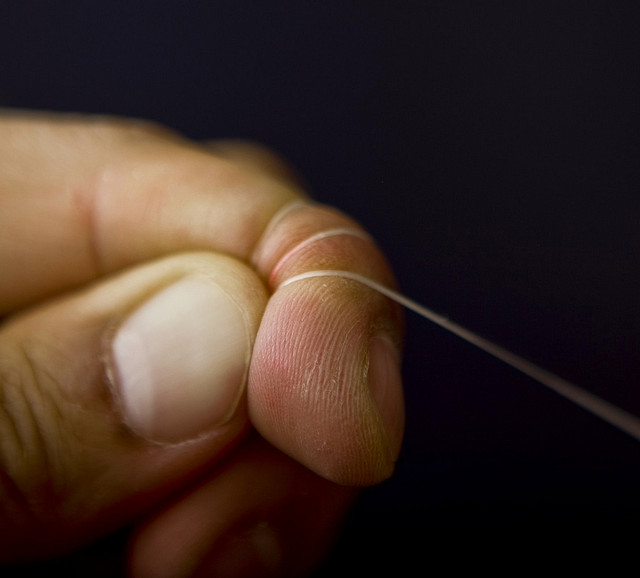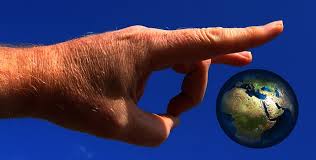
I wonder about the environment, personal responsibility and the impossibility of starting a flossing routine.
Recently, I went to the dentist and it was discovered that I had five cavities. Five. As a functioning adult with reasonable hygienic habits, this was slightly traumatizing. Then the dentist posed the question I so often evade or joke my way out of: do you floss?
And the answer is: No. I don’t floss.
I don’t floss!
It feels good to admit it.
I floss only when I get a kernel of popcorn stuck in an uncomfortable part of my teeth and can’t be bothered to wait it out. I don’t floss. I know I should. I know it’s a healthy, responsible practice. But I don’t do it. Can’t bring myself to add it to my daily routine.
And yet here I was with a looming dental bill over my head, essentially putting my cavities on a layaway payment plan until November when I will theoretically be able to afford to have them filled. I think of all the things I would rather use that money for (travel). And I curse myself for not having the willpower or motivation to take care of my teeth when I had the chance.
In the meantime, do you suppose I have been flossing? The embarrassing answer is: no. I just started two days ago, two months after the cavity debacle. It took me two months, sore gums and borrowed floss from a crew mate to finally, finally start a practice of flossing.
It got me thinking. What is that impulse (or lack thereof) that makes us not do things we know are good for us?
On a larger scale, even. I thought about the mentality of a person who doesn’t floss despite all the financial and health risks associated with multiple cavities and tooth decay. Why did this feeling of frustration feel so vaguely familiar? Then it hit me: it’s how I feel when I think about the environmental movement.

I think about the constant stream of ignored warnings from climate change scientists. They are beating the drum for us to make some drastic and necessary changes in energy use among other things. And I have seen very little attention or change enacted from people in positions of leadership and influence in this country. There are people who seem to really believe that these threats are not a real or high-ranking priority.
I wonder what it would take for people to put time and energy toward the environment; toward a sustainable future. Certainly the predictions are scary enough. (So is the threat of a root canal.)
So why can’t we floss? Why can’t we put the work in while it has a chance of helping; doing the work of prevention rather than clean up?
Surely corporations have a huge hand in this situation. But even on an individual level: we know that some of our daily actions are wreaking havoc on the earth. Yet many of us continue on as if someone else has to change their habits, not us. Of course I’m speaking generally. There are people who might read this who are eco-warriors. You probably floss, too. Thank you.
But for the rest of us, what’s going on?
What stops us as a people from listening to climate change warnings and acting appropriately?
I include myself in this. I recycle. Most of the time. I compost and eat vegetarian for my job. But. I don’t cut out the modern comforts that I could easily live without. Coffee from disposable cups? Sometimes I do it and it feels bad. Do I still occasionally buy new clothes from Target? Yes.
I spend an inordinate amount of time on the internet, reading my horoscope or poking around Facebook, liking causes instead of participating and getting active. I eat packaged foods when I’m off the ship I work on. I don’t protest though I have gone to one or two. I don’t work on Greenpeace or Sea Shepherd boats, despite my interest in both the environment and the maritime world. I write strongly worded letters to the appropriate people but am sometimes unsure of how to best contribute to this earth I have loved since my first dip in the Chesapeake Bay as a baby.
I think my point is: I have to do better than I’m doing. We all do.
It’s not enough anymore, at this critical stage to say I’m trying.
It’s time to act. To become aware of a picture bigger than our own lives.
My solution for the time being lies in education. I teach environmental ed on a wooden sailboat for a living these days. My message to my students is one of mindfulness; of individual responsibility.
I try to get them to consider the world around them as something they are borrowing for a while. I always feel like I treat things better when I borrow them than when they are “mine.” I am in no way an expert but I am learning.
It is my humble opinion that each of us should be horrified at the damage we have collectively caused our earth. We cannot expect to abuse something and demand perfection from it like we do with our planet.
Species are being eradicated due to habitat destruction and reefs are being damaged at such an alarming rate I can’t even keep up. Our trash and toxic chemicals end up in the ocean.
It seems like humans view the planet as a lover who will always accept us into their bed, no matter how disdainfully we treat them. Like the ocean will always be there to accept our garbage. It’s that mindset which will be our ultimate undoing, I think.

I once wondered what it would be like to see the true cost of environmental damage. I imagined a doomed environment with no trees, a few humans, ashy skyscrapers and flaming cars. The truth is, it’s much simpler and closer to home than that imagery.
After spending two years living on the small Pacific island of Kiribati, I believe I may see the true picture of climate change in my lifetime.
The people of Kiribati are so vulnerable to the sea level rising due to climate change that they are all but begging the world to help; to notice. It is possible that they will be the first climate change refugees. It will happen in our lifetime. It’s already happening. And they won’t be the last.
We need to try harder.
So the question remains: can we figure out how to do this thing? Is it possible to commit ourselves, as a people, to the improvement of the planet which has supported us our entire lives?
I wonder.
I don’t know how much faith I have left in people to get outside themselves and contribute to the world.
But then I think about starting small.
I think about a student with a tiny spark of passion for the plankton which create the oxygen we breathe.
I think about my parents at age 64, trying to stop eating sugar and processed foods.
I think about my sailor friends who live very simple, very green lives.
And I think, if we can all start with our daily habits and alter some of them to positively affect our planet, it’s a damn good start.
Also, start flossing if you don’t. It really is good for you.
Relephant Read:
How to Heal the Earth (For Dummies).
Author: Erin Johnson
Editor: Catherine Monkman
Photos: Author’s Own, Pixabay, GM/Flickr


 Share on bsky
Share on bsky




Read 15 comments and reply